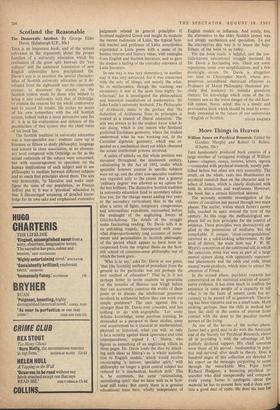Scotland the Reasonable
The Democratic Intellect. By George Elder Davie. (Edinburgh U.P., 50s.)
THIS is an important book, and of the utmost relevance to the arguments about the proper function of a university education which the realisation of the great split between the 'two cultures' and the imminent foundation of new English universities have precipitated. Dr. Davie's aim is to examine the special character- istics of Scottish university education as it de- veloped from the eighteenth into the nineteenth century, to document the attacks on the Scottish system made by those who wished to bring it into conformity with that of Oxbridge, to explain the reasons for the whole controversy and to record its results. He makes no secret of his own sympathies with the old Scottish system, indeed makes a most persuasive case for it: it is in his explanation and defence of the peculiarities of that system that the chief value of his book lies.
The Scottish tradition in university education was a non-specialist one: students came up at fourteen or fifteen to study philosophy, language and science in close association, at an element- ary level compared with Oxbridge so far as the actual rudiments of the subject were concerned, but with encouragement to speculate on the human implications of each subject and to use philosophy to mediate between different subjects and to reach first principles about them. The aim was democratic, `to liberalise and make intel- ligent the mass of our population,' as Francis Jeffrey put it; it was a 'practical' education in that it discouraged amassing of detailed know- ledge for its own sake and emphasised evaluative judgments related to general principles. If Scotland neglected Greek and taught its students the merest rudiments of Latin, the typical Scot- tish teacher and professor of Latin nevertheless expounded a Latin poem with a sense of its human interest and literary value, with analogies from English and Scottish literature, and so gave the student a feeling of the everyday relevance of Latin literature.
In one way it was very elementary, in another way it was very advanced, for it was concerned with the why of things, not merely the what. So in mathematics, though the teaching was elementary it was at the same time highly 'in- tellectual;' for it investigated the philosophical and historical foundations of mathematics. Sir John Leslie's university textbook, The Philosophy of Arithmetic, states in the preface that `the deduction of Arithmetic from its principles is treated as a branch of liberal education.' The aim was always to let the student know what he was doing, which is one reason why Scotland preferred Euclidean geometry, where the student understood what he was working out, to the Cartesian algebraic geometry, which was re- garded as a mechanical short cut which obscured the actual intellectual process involved.
A series of attacks on this whole position was mounted throughout the nineteenth century, culminating in the Act of 1892, under which specialist honours courses in specific subjects were set up, and the older non-specialist tradition was regarded only to the extent that a general `ordinary degree' was allowed as an option for the less brilliant. The distinctive Scottish tradition in university education (and in secondary educa- tion too, for the change meant adding two years to the secondary curriculum) thus in the end, after a series of fights, temporary compromises and intermediate expedients, succumbed before the onslaught of the anglicising forces of Gleichschaltung. The details of the struggle make fascinating reading; Dr. Davie tells it as an unfolding tragedy, interspersed with some- what disproportionately long accounts of move- ments and personalities in Scottish philosophy of the period which appear to have been in- corporated from the original thesis on the Scot- tish school of common-sense philosophy out of which the book grew.
`Who is to say,' asks Dr. Davie at one point, `that [the Scottish] method of procedure from the general to the particular was not perhaps the best method of education?' That is, is it not perhaps better to invite students to generalise on the beauties of Horace and Virgil before they can accurately construe the works of these poets or to discuss the intellectual processes involved in arithmetic before they can work out simple problems? The case against this is stronger than Dr. Davie ever concedes, and has nothing to do with anglophilia. 'Let some definite knowledge, some previous training, be demanded as a passport to these studies, some real acquirement be it classical or mathematical, physical or historical, what you will, so only it be a security against blank ignorance and total unpreparedness,' argued J. C. Shairp, who figures as something of an anglicising villain in these pages. Dr. Davie loads the dice by attack- ing such ideas as Shairp's as 'a whole assimila- tion to English models,' which would involve encouraging 'a narrow, specialist spirit,' with philosophy no longer a great central subject but reduced to 'a mechanical, bookish drill.' This is, he comments, the same 'rationalising, assimilating spirit' that we have with us in Scot- land still today. But surely there is a genuine educational issue here, wholly independent of English models or influence. And surely, too, the alternative to the older Scottish system was not simply mechanism and specialism. To put the alternatives this way is to lessen the help- fulness of the book to us today.
Yet the book really is helpful, and the too- little-known educational struggle narrated by Dr. Davie a fascinating one. There are some repetitions, some over-simplifications, and a few downright errors. Dr. Davie is altogether too kind to Christopher North whose pre- posterous secondhand rhetorical effusions as Professor of Moral Philosophy illustrated pre- cisely that tendency to mistake grandiose rhetoric for knowledge which some of the re- formers saw as the worst danger of the old Scot- tish system. Never mind; this is a timely and provocative book which should be read by every- body interested in the future of our universities






























 Previous page
Previous page